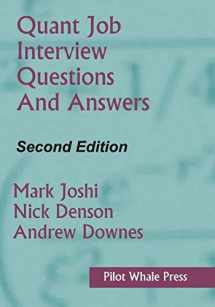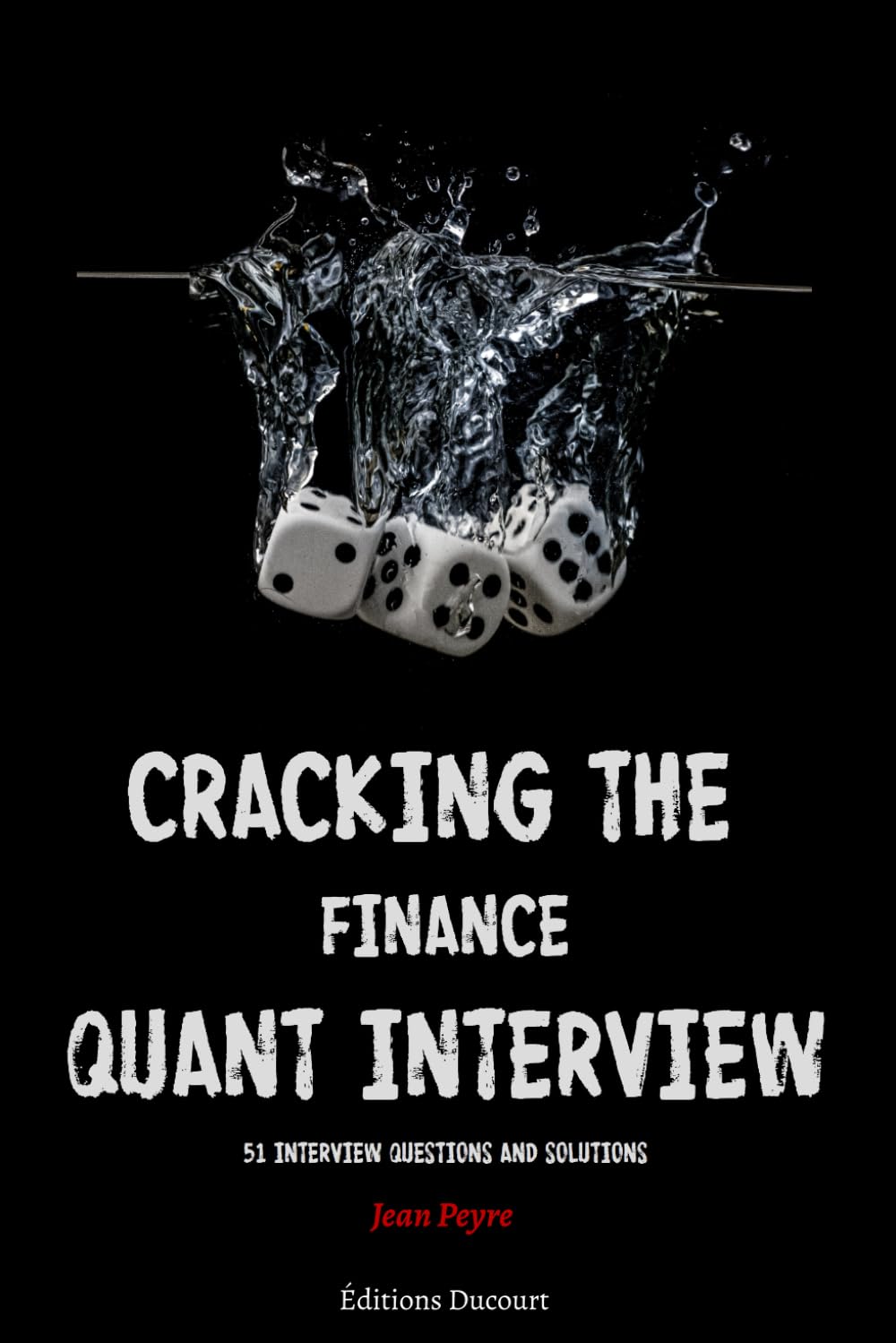Preparing for the Quant Role: Key Skills and Knowledge
The world of quantitative finance offers exciting opportunities for individuals with strong analytical and problem-solving abilities. Quants, or quantitative analysts, play crucial roles in various financial institutions. These roles include developing trading strategies, managing risk, and pricing complex financial instruments. Acing quant job interview questions and answers requires a solid foundation in several key areas. These areas include mathematics, statistics, programming, and financial modeling. The relative importance of each skill can vary depending on the specific quant role.
Mathematics provides the theoretical framework for understanding financial models. Linear algebra, calculus, and differential equations are particularly important. Statistics is essential for analyzing data, testing hypotheses, and making predictions. A strong understanding of probability theory, statistical inference, and time series analysis is crucial. Programming skills are necessary for implementing models, analyzing large datasets, and automating trading strategies. Python and C++ are the most commonly used languages in quantitative finance. Financial modeling involves creating mathematical representations of financial markets and instruments. This requires a deep understanding of financial concepts and the ability to translate them into quantitative models. To navigate quant job interview questions and answers effectively, candidates must be prepared to demonstrate proficiency in these core competencies.
Different types of quant roles emphasize different skill sets. For example, a quant trader might need strong programming and statistical skills to develop and implement trading algorithms. A quant researcher might focus on developing new pricing models, requiring advanced mathematical and financial knowledge. Model validation quants assess the accuracy and reliability of existing models, demanding a strong understanding of both mathematics and statistics. Preparing for quant job interview questions and answers also means tailoring your skills and experiences to match the specific requirements of the target role. Demonstrating an understanding of the nuances of each role will significantly improve your chances of success.
Decoding Common Quantitative Interview Questions
This section is designed to equip candidates with a strong understanding of the core concepts frequently assessed during quantitative finance interviews. The focus extends beyond simply memorizing solutions; it aims to foster a deep comprehension of the underlying principles and problem-solving methodologies vital for success. By grasping these fundamental concepts, candidates will be better prepared to tackle a wide range of quant job interview questions and answers, even those they haven’t encountered before. Remember that the quant job interview questions and answers require more than just memorization.
The landscape of quantitative finance interviews is diverse, encompassing various categories of questions designed to evaluate different aspects of a candidate’s skillset. These categories typically include probability, statistics, brain teasers, coding challenges, and questions pertaining to financial markets. A well-rounded preparation strategy involves familiarizing oneself with each of these areas and developing proficiency in applying relevant concepts to solve problems. Candidates should be prepared to articulate their reasoning clearly and demonstrate a systematic approach to problem-solving, reflecting a genuine understanding of the subject matter. This section provides a framework for tackling quant job interview questions and answers in each of these categories.
The ability to dissect and analyze complex problems is paramount in quantitative finance. Interviewers often use seemingly difficult questions to assess a candidate’s capacity for logical thinking and their ability to break down problems into manageable components. Therefore, it is crucial to cultivate a methodical approach to problem-solving, starting with a clear understanding of the question’s objective and constraints. From there, candidates can leverage their knowledge of relevant mathematical and statistical concepts, alongside their coding skills, to develop effective solutions. By mastering these problem-solving techniques, candidates can confidently navigate the challenges presented in quant job interview questions and answers and showcase their potential to excel in a demanding quantitative role. Practicing with a diverse range of quant job interview questions and answers is essential for building confidence and refining problem-solving abilities.
How to Tackle Probability Problems in Quant Interviews
Probability questions are a staple in quant job interview questions and answers, designed to assess a candidate’s understanding of fundamental probabilistic concepts and their ability to apply them to real-world scenarios. Mastering these concepts is crucial for success in a quant job interview. Interviewers often explore a candidate’s grasp of conditional probability, Bayes’ theorem, expected value, and common probability distributions. Understanding these elements forms the bedrock of tackling probability-related quant job interview questions and answers effectively.
To effectively address probability-based quant job interview questions and answers, consider this example: “What is the probability of drawing two aces in a row from a standard deck of cards, assuming the first card is not replaced?” This question tests understanding of conditional probability. The probability of drawing the first ace is 4/52. Given that an ace has been drawn, the probability of drawing a second ace becomes 3/51. Therefore, the overall probability is (4/52) * (3/51). When approaching such problems, start by clearly defining the events and their dependencies. Drawing diagrams can often help visualize the problem and clarify relationships. Always double-check whether events are independent or dependent, as this significantly impacts the calculation.
Another crucial concept often explored in quant job interview questions and answers is Bayes’ theorem, which deals with updating probabilities based on new evidence. For instance, a question might involve calculating the probability of an event given that another event has occurred. The expected value, representing the average outcome of a random event, is another key area. Candidates should be comfortable calculating expected values for various scenarios. Also, familiarity with common probability distributions, such as the normal, binomial, and Poisson distributions, is essential. Knowing the properties of these distributions and when to apply them is vital for quant job interview questions and answers. By focusing on these areas and practicing with sample quant job interview questions and answers, candidates can significantly improve their performance in this critical section of the interview.
Mastering Statistics Questions: A Step-by-Step Approach
Statistical concepts are essential for quant roles. A strong understanding of these concepts is crucial for success in quant job interview questions and answers. This section will delve into key areas, including hypothesis testing, regression analysis, time series analysis, and stochastic calculus. Illustrative examples will be provided to showcase their application in financial contexts.
Hypothesis testing forms a cornerstone of statistical inference. It allows quants to validate assumptions and make informed decisions based on data. Understanding p-values, confidence intervals, and different types of statistical tests (e.g., t-tests, chi-squared tests) is paramount. Regression analysis is another vital tool, enabling the modeling of relationships between variables. Linear regression, multiple regression, and non-linear regression techniques are frequently used in finance to predict asset prices, assess risk, and identify trading opportunities. When tackling quant job interview questions and answers, remember to clearly state your assumptions.
Time series analysis focuses on analyzing data points collected over time. This is particularly relevant in finance, where understanding trends and patterns in financial markets is critical. Techniques like ARIMA models, GARCH models, and moving averages are employed to forecast future values and manage risk. Stochastic calculus provides the mathematical framework for modeling random processes, which are inherent in financial markets. Concepts like Brownian motion, Ito’s lemma, and stochastic differential equations are crucial for understanding derivatives pricing and risk management. This is essential for tackling quant job interview questions and answers. Throughout this section, we will demonstrate how to interpret statistical results and draw meaningful conclusions. We’ll also discuss the appropriate statistical methods for analyzing financial data.
Unlocking Brain Teasers: Logic and Problem-Solving Strategies
Brain teasers frequently appear in quant job interview questions and answers, serving a distinct purpose. They are designed to evaluate a candidate’s logical thinking, problem-solving aptitude, and creative ingenuity, qualities highly valued in the quantitative finance field. These puzzles often seem perplexing at first glance, but they are not about recalling specific formulas or facts. Instead, they assess how one approaches unfamiliar problems and applies reasoning skills under pressure.
Examples of classic brain teasers include scenarios involving weighing scales, probability conundrums with seemingly paradoxical solutions, or spatial reasoning challenges. When faced with such a question during a quant job interview, the initial step involves active listening and ensuring a clear comprehension of the problem’s parameters. Effective strategies for tackling brain teasers include working backwards from the desired outcome, identifying patterns or symmetries within the problem, and simplifying the problem into smaller, more manageable components. Candidates should not hesitate to ask clarifying questions to gain a better understanding of the information provided.
The key to success with brain teasers in quant job interview questions and answers lies not just in finding the correct answer, but also in articulating the thought process clearly. Interviewers are interested in understanding how candidates arrive at their conclusions. Therefore, it’s crucial to explain each step logically and justify assumptions. Even if the final answer is incorrect, demonstrating a structured and rational approach can still impress the interviewer. Maintaining composure and thinking methodically are essential, even when the problem seems daunting. Practice with a variety of brain teasers beforehand can significantly improve performance and build confidence in handling these types of quant job interview questions and answers.
Coding Challenges: Data Structures and Algorithms in Finance
Coding proficiency is increasingly vital for modern quant roles. Quant job interview questions and answers often involve demonstrating practical coding skills. This section emphasizes the essential data structures and algorithms frequently tested in coding interviews for quant positions. These include arrays, linked lists, trees, and graphs. Algorithms such as sorting, searching, and dynamic programming are also crucial.
Candidates should be prepared to implement these concepts in a language like Python or C++. The ability to apply these tools to financial applications is key. Expect quant job interview questions and answers that require you to manipulate financial data. This might involve tasks like calculating portfolio risk or simulating stock prices. For instance, you might be asked to implement a function to calculate the Sharpe ratio. Or you could be challenged to use dynamic programming to optimize a trading strategy. The ability to write clean, efficient, and well-documented code is extremely important. Interviewers are looking for candidates who can not only solve the problem but also write maintainable code.
Effective coding goes beyond just finding a solution. It involves creating robust and reliable systems. When facing coding challenges, first clarify the requirements. Then, consider the time and space complexity of your proposed solution. Optimize for both efficiency and readability. Comment your code to explain your logic and assumptions. Test your code thoroughly with various inputs. This includes edge cases, to ensure its correctness. Many quant job interview questions and answers assess not only your coding skills but also your problem-solving approach and attention to detail. By mastering these data structures, algorithms, and best practices, you will be well-prepared to tackle the coding challenges presented in quant interviews and increase your chances of landing your dream quant job.
Navigating Financial Markets and Modeling Questions
Questions pertaining to financial markets, derivatives pricing, and risk management are frequently encountered in quant job interview questions and answers assessments. A strong grasp of fundamental concepts is essential for success. Candidates should be prepared to discuss options, futures, swaps, and related instruments. Understanding various pricing models, such as the Black-Scholes model and binomial trees, is also vital. These models provide frameworks for valuing derivatives and managing risk.
Interviewers often present practical problems that require the application of these concepts. For example, a candidate might be asked to calculate the price of a European call option using the Black-Scholes formula or to construct a hedging strategy for a portfolio of assets. Proficiency in applying these models demonstrates a practical understanding of financial markets. Quant job interview questions and answers in this area require not only theoretical knowledge but also the ability to apply that knowledge to real-world scenarios. Candidates should also be prepared to discuss the assumptions and limitations inherent in each model. The Black-Scholes model, for instance, assumes constant volatility and risk-free interest rates, which may not always hold true in the market.
Furthermore, understanding how to handle market volatility is crucial. Volatility plays a significant role in derivatives pricing and risk management. Candidates should be familiar with different measures of volatility, such as implied volatility and historical volatility. They should also be able to discuss the impact of volatility on option prices and portfolio risk. In addition to theoretical knowledge, practical experience with financial modeling software is highly beneficial. Being able to implement pricing models and simulate market scenarios can significantly enhance a candidate’s performance in quant job interview questions and answers. The ability to clearly articulate the limitations of models and adapt them to changing market conditions is a key differentiator. Demonstrating a deep understanding of these nuances sets candidates apart and showcases their readiness for a quant role.
Presenting Your Solutions: Communication and Clarity
The ability to articulate solutions effectively is paramount in a quant job interview. It’s not merely about arriving at the correct answer; it’s about demonstrating a clear understanding of the underlying principles and conveying your reasoning in a structured and coherent manner. The evaluation of quant job interview questions and answers extends beyond accuracy to encompass communication skills. Interviewers seek candidates who can explain complex concepts concisely and persuasively.
Structuring your explanations is crucial. Begin by outlining your approach to the problem, highlighting the key assumptions and methodologies you intend to employ. Use clear and precise language, avoiding jargon or technical terms that may not be readily understood. Break down complex problems into smaller, more manageable steps, explaining your rationale at each stage. Visual aids, such as diagrams or graphs, can be particularly helpful in illustrating complex concepts and making your explanations more accessible. Actively listen to the interviewer’s questions and respond thoughtfully, addressing their specific concerns and demonstrating your ability to think critically and adapt your approach as needed. Remember, demonstrating a solid understanding of the ‘why’ behind your answers is as important as getting the ‘what’ correct. This ability to clearly articulate the reasoning behind quant job interview questions and answers greatly improves your overall impression.
Practice is key to honing your communication skills. Engage in mock interviews with peers or mentors to simulate the interview environment and receive constructive feedback on your communication style. Record yourself presenting solutions and analyze your performance, paying attention to your clarity, conciseness, and overall presentation. Focus on actively listening to the interviewer’s questions and formulating thoughtful responses. Pay attention to your body language and maintain eye contact to convey confidence and engagement. By consistently practicing and refining your communication skills, you can significantly enhance your ability to present your solutions effectively and impress potential employers. Strong communication skills greatly improve your impression when answering quant job interview questions and answers and demonstrating a strong grasp of quantitative finance principles.
https://www.youtube.com/watch?v=hZALF58_qsY



